English Words in Action, Group G
(a variety of English words which have developed through history and are currently used in our modern age)
Simply click on this banner (or the following link) and you will be on your way to stimulate your brain for greater word comprehension with quizzes based on some of the words in this unit.
There are people who need to do more than simply provide some glib answers to difficult questions.
2. Relating to speaking in a smooth, easy way which is usually not sincere: There are just too many glib politicians who cause people to mistrust them.3. Etymology: from Middle Low German glibberich, "slippery" and glib means being smooth or slippery in talk or manner than sincere.
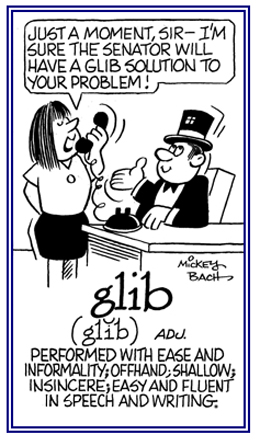
Go to this Word A Day Revisited Index
so you can see more of Mickey Bach's cartoons.
Glitches in the speaker's schedule caused some delays in his arrival at the press conference.
2. A sudden unwanted electronic signal; such as, from a power surge or a temporary irregular over-supply of power: The neighborhood had a spike or a glitch with the voltage in their electrical current during the night as a result of the lightening storm.It is possible that there is a glitch in the computer program which may cause the hardware to malfunction or there might be a glitch in the computer itself.
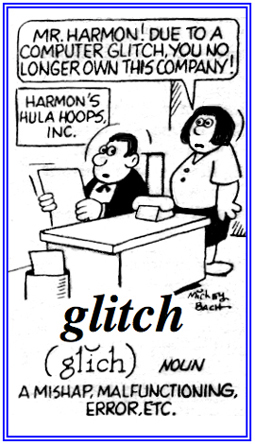
Go to this Word A Day Revisited Index
so you can see more of Mickey Bach's cartoons.
Bill's computer glitched again last night and then it was normal again in the morning when he restarted it.
Tom's job includes troubleshooting when customers' computer systems glitch or don't function as they should.
2. To triumph, to relish, to revel in: When Sam won the tennis championship, he gloated about it in front of the loser.
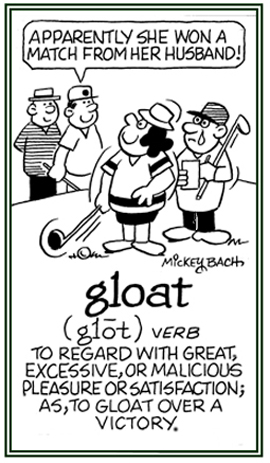
Go to this Word A Day Revisited Index
so you can see more of Mickey Bach's cartoons.
Art's teacher was glowering at him when she saw him looking at his cell phone while he was taking the chemistry test.
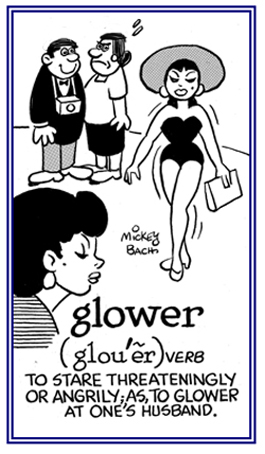
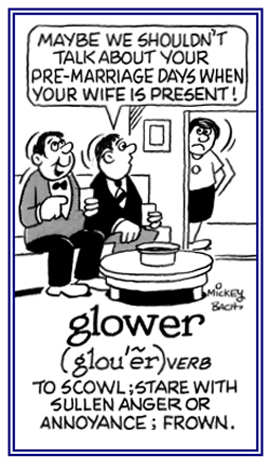
Go to this Word A Day Revisited Index
so you can see more of Mickey Bach's cartoons.
2. Anything that urges, or forces, people to respond: The threat of some kind of legal action is a strong goad for companies to follow government regulations.
2. Etymology: from Old English gad of Germanic origin, "spearhead" or a "spiked or sharp pointed stick which was used to drive cattle, sheep, etc.; however, people can be poked or provoked into doing something with words, too; for example, a parent can goad a child into washing his or her hands before coming to the dinner table.
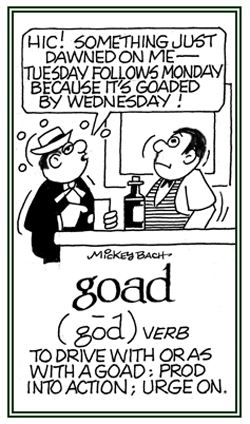
Go to this Word A Day Revisited Index
so you can see more of Mickey Bach's cartoons.
2. Something that is being expressed in an overly complicated manner: In an effort to sound very intellectual, the professor included a lot of gobbledygook in his lectures.
3. Unintelligible, inflated language; usually the hallmark of many government agencies: Having waded through the gobbledygook of the government documents, Mildred decided not to apply for the grant.
4. Involved, pedantic, repetitious, and pompous jargon, relying heavily upon Latinized expressions and meaningless clichés; applied especially to the written and spoken language of bureaucrats and professional politicians: The doctors attempted to impress each other by quoting a lot of gobbledygook about their theories and discoveries.
5. Etymology: coined by Texas Congressman, Maury Maverick, U.S. Congressman and chairman of the Smaller War Plant Corporation, in a 1944 memo after attending a wordy committee meeting. He is said to have vehemently denounced the long-winded, pretentious speech of his colleagues and other government spokespeople.
He later said the word just came to him, but perhaps he was thinking of the turkey gobblers back in his native Texas and of the "gobbledygobbling" sound they made while strutting so pompously, and that their gobbling ended in a "gook" sound.
Gobbledygook was just a continuation of the New Deal's bureaucratic officialese, which delighted in such terms as "activation, clearance, coordinator, implementation, objective, to process", and "roll-back".
By the 1950s, such talk, or writing, was also called "bafflegab" and by the early 60s, "Pentagonese"; and even now, "whitehallese".
Also known as, "bureaucratese", or the legalistic, wordy style of communication often characteristic of government announcements.

Go to this Word A Day Revisited Index
so you can see more of Mickey Bach's cartoons.
During Mark's tour of the national park, he was able to see the waterfall at the far end of the gorge.
2. The throat or esophagus: Mack's dog had a chicken bone caught in its gorge but it was able to cough it up.3. Etymology: the term goes back to Latin gurges, "whirlpool".
2. Etymology: from Middle English and from Old French gorger; from gorge, "throat"; based on Latin gurges, "whirlpool".
2. Etymology: from Gorgon in the Greek myths consisting of three sisters having snakes for hair and faces so horrible that anyone who looked at them turned to stone out of terror.
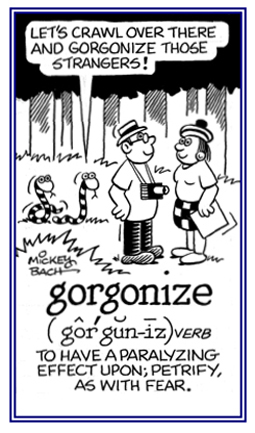
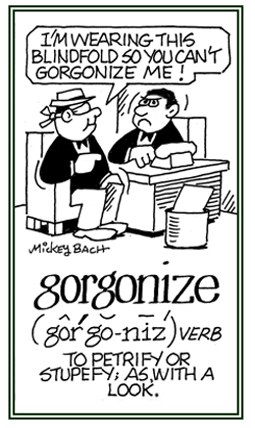
Go to this Word A Day Revisited Index
so you can see more of Mickey Bach's cartoons.
2. Etymology: from French gourmandise, "gluttony"; from gourmand, "eating excessively" or "gobbling food".
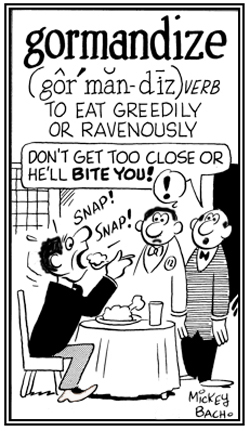
Go to this Word A Day Revisited Index
so you can see more of Mickey Bach's cartoons.
The term gormless is used primarily in British English.
2. A craving or acquisitiveness that has been taken to the extreme; especially, regarding material wealth: Goldie made no effort to conceal her greeds for money and power.
3. Etymology: from Old English grædig, "voracious"; also, "covetous"; from Proto-Germanic grædagaz (hypothetical prehistoric ancestor of all Germanic languages, including English).
In Greek, the word was philargyros; literally, "money-loving".
Greed is from a 1609 back-formation. A German word for it is habsüchtig, from haben, "to have" + sucht, "sickness, disease"; with the sense of tending toward "a passion for".
Links to all of the groups of English words in action, Groups A to Z.
You may see the bibliographic list of sources of information for these words in action.


